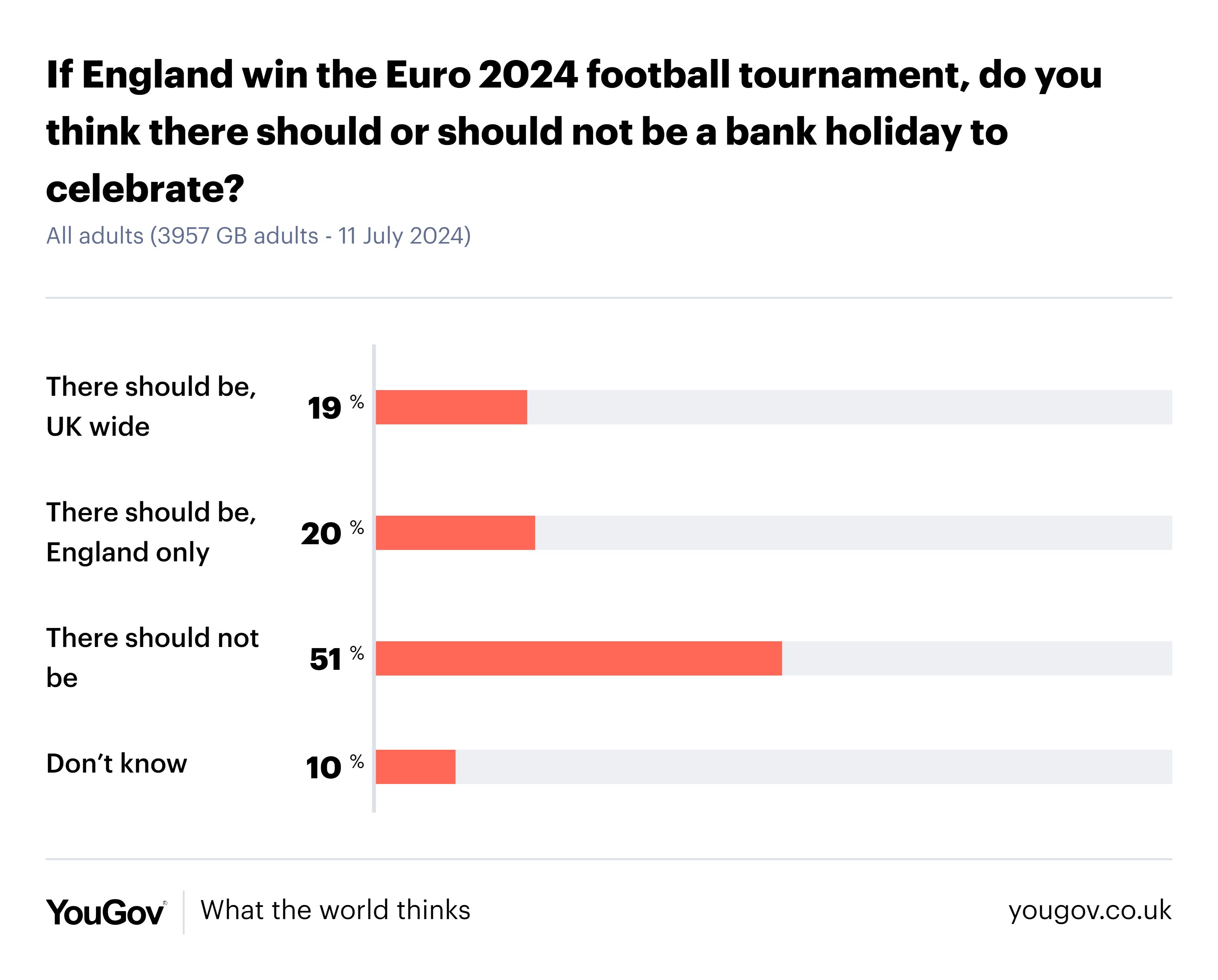
Whisper it (and don’t jinx anything). But the England men’s football team could soon win its first major tournament in almost 60 years; and with it, an extra day’s holiday for us all.
This Sunday, Gareth Southgate’s dream team will play Spain in the Euro 2024 championship finals. They won’t be favourites to win, but England fans are preparing for a big night of celebrations; and there’s rumours that a bonus bank holiday may be on the cards.
Prime minister, Sir Keir Starmer has agreed the country will mark the occasion, but has stopped short of promising another day of annual leave. A YouGov poll suggests that most Brits think we shouldn’t have one (living up to the stereotype of the grumpy Englishman).
Still, others are crossing their fingers for an extra lie-in. So if we do get one, what would a football bank holiday mean for employers? And would all workers be entitled to it?
Are all employees entitled to a bank holiday?
Whether or not an employee will qualify for the extra bank holiday (should it be announced) will depend on their employment contract.
- If an employee’s contract states a worker qualifies for annual leave days plus bank holidays, they will be entitled to this extra bank holiday.
- If the contract states that they qualify for a certain amount of leave inclusive of bank holidays, bosses should make the call as the extra day is not explicitly included.
- If the contract states a worker is entitled to the “usual” bank holidays, the employer can judge whether to allow the day off as this will not be a ‘usual’ bank holiday.
Most service industries have it written into worker contracts that they may need to work bank holidays. Employees in these sectors should not expect the day off.
However, some brands have recognised the hypothetical bank holiday as an opportunity to boost their employee benefits packages and introduced other, supplementary perks instead.
Tesco and Lidl have both already declared that they will open one hour later on Monday morning to give hungover employees (and customers) a longer recovery period.
Meanwhile, trendy drinks startup Dash Water has said its employees can start work at a later time of 10.30am on Monday, regardless of the outcome of Sunday’s match.
Do employers have to honour bank holidays?
Under current employment laws, there is no statutory requirement for staff to be given time off on bank holidays (they just have to provide the minimum of 5.6 weeks’ paid holiday).
However, employers may be minded to give the additional leave to workers if they feel it is a worthy cause. Last year, workers were given two extra, last-minute days off to mark the funeral of Queen Elizabeth II and the coronation of King Charles III.
Firms may feel less generous with regards to the Euro football championships. While many are calling for the England squad to be knighted if they win, they are hardly public servants.
There is also the stickier question of whether the whole of the UK should have a public holiday or not. Wales and Northern Ireland did not qualify for this year’s Euros, while Scotland crashed out of the group stages.
Majority of Brits think bank holiday is a bad idea
According to a YouGov poll, the majority of Brits are hoping for a 9am start at the desk rather than a day out in the sunshine.
When asked if they think there should be a bank holiday to celebrate an England win, 51% of Brits said there should not, versus a total of 49% who responded there should be.
They might not all be party poopers. The UK has been struggling with woeful productivity rates that has resulted in a poor economic climate for the past two years.

Image source: yougov.co.uk
Still, a match day might be just what’s needed to make consumers spend again. Research indicates that independent pubs and bars have seen sales increase by almost 10% during England and Scotland games at this year’s Euro championships.
Rivalries between the home nations also influenced the responses given. Respondents were also split on whether the bank holiday should be UK wide or exclusive to England.
19% of the nearly 4,000 workers surveyed are in favour of allowing Scotland, Wales, and Northern Ireland to join in on the festivities, versus 20% who say it should be just for Brits.
Flexible bank holidays: how do they work?
If some employees do not want to work a bank holiday, then companies can introduce a flexible bank holiday policy. This will allow staff to exchange a government-set public holiday for a more convenient date (unless the entire business chooses to close).
The policy is beneficial for both parties. Employees feel empowered to take their leave when they choose, while the company is less likely to be impacted by low manpower.
Still, workers might change their mind when Sunday comes around. If England can pull off a historic win, the naysayers might find their spirits are lifted alongside the Euros 2024 trophy.





